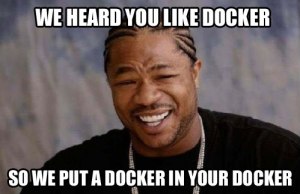Back in mid-2014 I was in the midst of Docker-izing the build process at Virtual Instruments. As part of that work I’d open sourced one component of that system, the Docker-in-Docker Jenkins build slave which I’d created.
While claiming that I was driven by altruistic motivations when posting this code to GitHub (GH) would make for a great ex-post narrative, I have to admit that the real reasons for making the code publicly available were much more practical:
- At the time the Docker image repositories on the Docker Hub Registry had to be tied to a GitHub repo (They’ve added Bitbucket support since then).
- I was too cheap to pay for a private GitHub repo.
… And thus the code for the Docker-in-Docker Jenkins slave became open source! 😀
Unfortunately, making this image publicly available presented some challenges soon thereafter: Folks started linking their blog posts to it, people I’d never met emailed me asking for help in getting set up w/this system, others started filing issues against me on either GH or the Docker Hub Registry, and I started receiving pull-requests (PRs) to my GH repo.
Having switched employers just a few months after posting the code to GH, dealing with the issues and PRs was a bit of a challenge: My new employer didn’t have a Dockerized build system (yet), and short of setting up my own personal Jenkins server and Dockerized build slaves, there was no way for me to verify issues/fixes/PRs for this side-project. And so “tehranian/dind-jenkins-slave” stagnated on GH with relatively little participation from me.
Having largely forgotten about this project, I was quite surprised a few weeks ago when perusing the GH repo for Disqus. I accidentally discovered that the engineering team at Disqus had forked my repo and had been actively committing changes to their fork!
Their changes had:
- Optimized the container’s layers to make it smaller in size,
- Updated the image to work with new versions of Docker,
- And also modified some environment variable names to avoid collisions with names that popular frameworks would use.
Prompted by this, I went back to my own GH repo, looked at the graph of all other forks, and saw that several others had forked my GH repo as well.
One such fork had updated my image to work with Docker Swarm and also to be able to easily use SSH keys for authenticating with the build slave instead of using password-based auth.
“How cool!”, I thought. I’d put an idea into the public domain a year ago, others had found it, and improved it in ways that I couldn’t have imagined. Further, their improvements were now available for myself and others to use!
My Delphix colleague Michael Coyle summed this all up very nicely, saying “As a software developer I can only realistically work for one organization at a time. Open source allows developers from different organizations to collaborate with each other without boundaries. In that way one actually can contribute to more than one organization at once.”
In hindsight I’m absolutely delighted that my unwillingness to purchase a private GitHub repo led to me contributing the Docker-in-Docker Jenkins slave to the public domain. There was nothing proprietary that Virtual Instruments could have used in its product, and by making it available other organizations like Disqus, CloudBees have been able to benefit, along with software developers on the other side of the planet. How exciting!


Dan, this is a great story and a demonstration of why open source is inevitable and now, relatively frictionless, especially if its minimal demands are a modicum of laziness which is readily accessible by anyone.